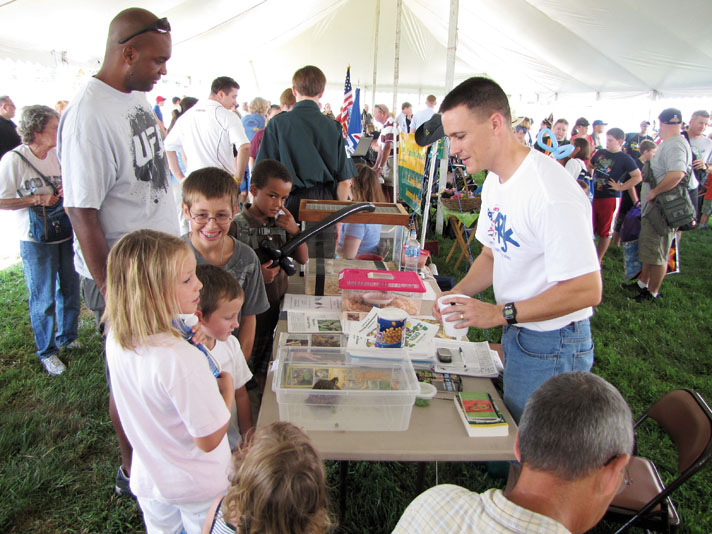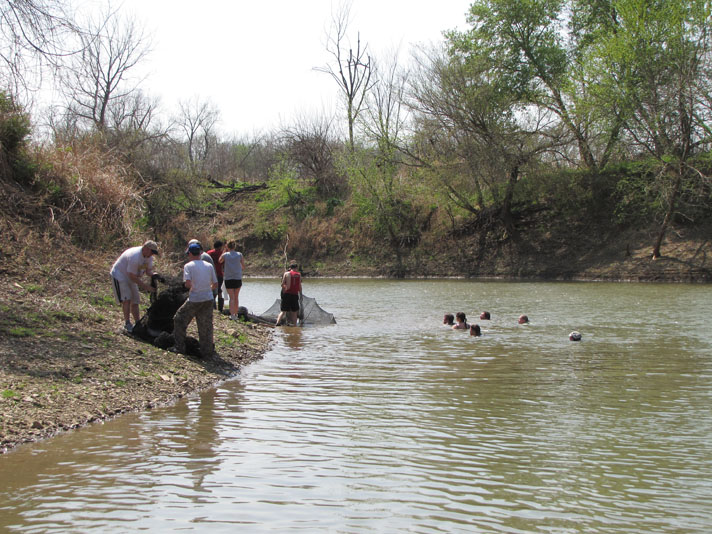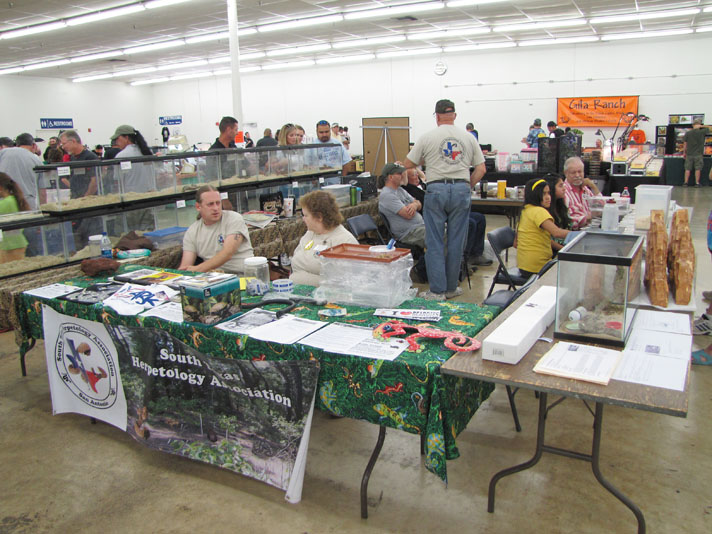Herp clubs exists for every aspect of the hobby. Some focus on herpetoculture, some on field observation and many blend both.
If you’re reading this article, you probably read REPTILES magazine regularly, and maybe some online forums, as well. Maybe you are a member of a herp club, or maybe you’ve never considered the idea. If not, wouldn’t you like to take your enjoyment of reptiles and amphibians to the next level?

Chris McMartin
Community events are a chance for herp clubs to educate people who wouldn’t normally seek out such displays. They can also be a chance to “cross-pollinate” and exchange information with municipal leaders and law enforcement, as well as conservation departments.
I’ve been a past and current member of six herp-related organizations at the local, regional, state and national levels. Some are well-established (i.e. they have existed for decades); others are recent additions to the herping community (within the past few years). Several of these clubs have a core group of longtime members, who still faithfully attend meetings and other events, but the popular topic of discussion among these members is how the club used to be much larger, more popular and was able to do more things, such as go on field trips and offer scholarships. The herps are all still there; if anything, they’re more accessible than ever. What, then, has caused some clubs to experience a decrease in membership and participation? While blame can be placed upon a number of causes, not the least of which is the increasing number of demands on one’s time, the 800-pound gorilla in the room seems to be the double-edged sword of the Internet.
A Tangled Web
The Internet can be a valuable tool, but it is no substitute for hands-on knowledge and face-to-face interaction with other enthusiasts. Even herp organizations largely based online frequently stage meetups, where members can join together for field herping, traveling to shows and other activities impossible from behind a computer screen. More importantly, while there is a wide array of expertise easily accessible at the click of a mouse on just about any herp-related topic one can think of, the animals themselves are not online and are therefore unavailable to see in three dimensions, touch and hold. Herp clubs often feature animals on display as part of presentations at meetings, brought by members for show-and-tell, or even offered for sale. It’s one thing to read about, or see photographs of, a reptile or amphibian online; it’s another matter altogether to be able to hold that animal in your own hands while asking a fellow herplover about proper husbandry techniques—maybe even paying the member a visit to learn more, and gaining a friend and mentor in the process. Local, real-world herp clubs provide that human touch the Internet simply cannot.
Developing An Interest In Reptiles
The problem with not being able to attract a crowd at a local herp society is not lack of interested people. Any visit to a herp expo will quickly disprove that idea. Hundreds, even thousands at the larger shows, pay to peruse vendor exhibits, even if they don’t buy anything. Why, then, is it so difficult to get a potential club member to show up at a meeting with free admission to determine whether they wish to join the organization?

Chris McMartin
Herp clubs exists for every aspect of the hobby. Some focus on herpetoculture, some on field observation and many blend both. Here, members of the Kansas Herpetological Society check turtle traps during a county survey.
To answer this, a club merely needs to look in the mirror and see what a prospective member sees. Do they see an insular group of longtime friends who get together once a month just to swap stories amongst themselves, reluctant to welcome new members into the fold? Or do they see a dynamic, active club, with field trips, picnics, behind-the-scenes zoo tours, exciting presentations at each meeting, and other opportunities? In other words, what does the herp society offer that a person can’t get elsewhere? If more clubs would take an honest assessment of their recent activities and how they can improve, instead of reflecting on how great things used to be, membership in these types of clubs could once again increase.
Want To Learn More?
Herp Society And Reptile Club Listings
There is a groundswell of enthusiasm for what is commonly called “citizen science.” Plenty of exciting research with reptiles and amphibians is conducted every year, but herpetologists can’t be everywhere at once, and they often can’t cover territory for herp surveys without assistance. Volunteers can contribute greatly to these efforts, and herp clubs are an easy means of soliciting them. If your club hasn’t assisted with a local survey or with collecting specimens for ongoing research, try it—you may be helping create the next generation of herpetologists!
If your local club seems to be in decline, it may be time to seek out new blood for the organization. But where should existing members look for prospective new members? Advertising at herp shows is an obvious answer; manning a booth is great, but even word-of-mouth efforts can work. Less-obvious choices may be advertising through outreach opportunities, such as community events at local parks and nature centers, state fairs, etc. Educational presentations at schools, libraries and museums are also excellent options.
Oftentimes, the same core group of members cycle through club leadership positions. If these members remain motivated and are adept at keeping the club exciting for the membership, there usually isn’t a problem. However, none of us are getting younger, and sometimes these members simply get burned out after serving as president/secretary/treasurer year after year. In addition, newer members may feel excluded from what they perceive as the “old heads” running the show without input from the younger (but enthusiastic) crowd. There’s hardly an easier way to sap a young, energetic new member’s enthusiasm than to make them feel left out, or that their talents and ideas are not wanted. Eventually, the perennial president will run out of steam, so what better time than the present to start training up the next generation of club leadership? Encourage them to run for office. Even if they’re apprehensive about taking on the responsibility, under the thoughtful supervision of an “old timer,” new members will often grow into their newfound roles.
With an infusion of enthusiastic new members, it may be easier to spread the word about a local herp club to a new audience. In addition to the traditional club offices of president/vice president, secretary and treasurer, it can be useful to elect an outreach coordinator. The younger crowd has many connections through their high school or college, and these are the people you want! After all, it seems like animal rights groups recruit heavily in such settings; it certainly wouldn’t hurt to provide “the other side of the story” by also recruiting herp clubs members in the same places. Don’t back away from advertising the club at all the area schools, but make sure you get permission first. Also, in addition to recruiting abilities of new, younger members, never underestimate the value of a strong back when setting up or tearing down at an outreach opportunity, club meeting or herp expo!
Don’t Have A Herp Club Nearby? Start One!
What if you’re in an area that doesn’t have a local herp society? Thanks to modern networking technology and the increased popularity of herpetoculture, there’s never been a better, or easier, time than the present to start a new club. The Internet may seem like a detractor from traditional clubs, but one benefit it offers is the ability to rapidly network. Rather than rely on finding kindred spirits through chance encounters at the city zoo or neighborhood pet shop, you can now easily search any number of social networking sites for people in your local area who share your interests. Kindred spirits are now greater in number, due in part to a robust herp husbandry product industry and increased availability of quality captive-bred animals. The relative explosion in recent years of affordable means to maintain a variety of species in captivity, combined with healthier specimens for sale compared to the preponderance of imported animals in the past, means more people who join the herp hobby will have a positive experience and stay with the hobby.

Chris McMartin
Elementary schools often contact local herp clubs to provide educational programs for their classrooms. Children are always excited to have visitors, especially when they bring animals. Scale presentations to match your target audience-your goal is to inspire, not overwhelm!
Another benefit of modern technology is the ease with which club materials can be produced. With most households having one or more computers, it’s a simple task to generate newsletters, and e-newsletters for members, and flyers for distribution at pet shops, high schools, colleges and Scout meetings. It’s also extremely easy to design, produce, and even sell club merchandise online-T-shirts commemorating annual auctions or field trips are always popular and are an excellent means used to fund club activities, guest speaker fees and even scholarships for deserving members. Finally, email lists offer an easy way to keep club members informed of the latest changes to scheduled events and also legislative action of interest.
Don’t We Have Enough Reptile Clubs?
Why start another club when so many already exist? The answer is simple: strength in numbers and the ability to “think globally, act locally.” Strength in numbers is more important today than ever, as a large number of varied interest groups are working hard to curtail participation in the hobby, either in the field or in private citizens’ own homes. Animal rights groups, while merely discouraging reptile and amphibian ownership on their websites and in literature intended for mass consumption (read: animal-lovers against keeping “unusual” pets but don’t want anyone to take away their pet dogs and cats), have prominent members in their organizations, who are very outspoken in their opposition to human “exploitation” of any kind of animal, cute-and-cuddly varieties included.

Chris McMartin
Herp expos are an easy and logical choice for outreach opportunities for clubs. They are also a great means of networking with fellow herpers and like-minded organizations. Here, the South Texas Herpetology Association provides items for raffle and a display of local native herpetofauna.
Reptiles and amphibians, although increasing in popularity as pets, are still not considered mainstream enough pets for their enthusiasts to have a credible voice. What dog and cat owners need to understand is that, due to this sidelining of herp owners and enthusiasts, groups like PeTA and HSUS have an easy way to introduce legislature to ultimately have the potential to ban all animal ownership. It’s much easier to change an existing law to incorporate additional species—including the “cute and cuddlies”—than to craft legislation from scratch. Current laws being considered start with species already shunned by the (slim) majority of the public—snakes—making such laws easily supported by politicians. However, simple amendments could quietly add an increasing number of species, families and even classes of animals, until all are banned from captivity. Enthusiasts could even be banned from interacting with herps and other animals in the wild. This has already happened in some areas, to varying degrees. Without herp clubs spreading the word, many people would otherwise not even know their child’s enjoyment of their pet gecko may be in jeopardy (or may already be illegal in their city!) thanks to lawmakers who don’t understand the positive impact such an animal can have.
Along with being able to keep abreast of national- and state-level legislation threatening the hobby, a healthy local club is able to have a positive impact on its community. One possibility is contacting local news media for radio interviews and newspaper articles about club activities. It’s always good to be proactive in getting out a herp-friendly message to the public. For example, your club may assist a Scout troop in earning a merit badge or two. Club members might organize a zoo-volunteer schedule to offer hands-on displays. A club could publicize its reptile rescue effort. The possibilities are limited only by the creativity of the club members.
Give The Reptile Hobby A Voice
The way to combat this is to make your voice heard through organizing. Individuals have their part to play, to be sure, but a local herp club can be a valuable grassroots effort in plugging in to a larger movement. National organizations advocating the herp hobby should consider working with local herp clubs to form affiliations. Such affiliations could initiate collaborative support agreements, whereby a portion of local herp club membership dues could be designated to support national-level efforts to combat laws that will ultimately affect us all. In these tough economic times, everyone is interested in making their money go further. Imagine the political clout the herp hobby would have if local societies had effective mechanisms, such as via national organization affiliation, to report membership strength and provide monetary support! No longer would herp enthusiasts be considered the “fringe” of society. Once lawmakers, and neighbors, realize the sheer numbers of people who see the hobby as no different than more traditional pastimes, we may just have an effective counterbalance to those who are working to eliminate our herp hobby.
Don’t get lulled into the notion that what happens in other states doesn’t impact your state or that banning anacondas won’t ultimately harm your ability to keep leopard geckos. Even the casual observer will notice striking similarities between bills introduced in many states regarding types of animals targeted and restrictions associated with each. If legislation is successful in one state, chances are that legislation will be used as a template for new bills in more states. This can only happen if we hobbyists, who believe herps have a useful purpose in our homes, as well as in the field, fail to stand up and speak out. There is strength in our numbers, and strength in our dollars. We merely need to ensure we have a way to make that strength known.
Speak Up And Be Counted
Let your voice be heard by teaming with others who share your goals. Join and, more importantly, get involved in your local herp club. Spread a positive message about herps to your local community. Grow the club you’re in. If you don’t have a club nearby, start one! And perhaps most importantly, coordinate your local activities and donations with other local, regional and national-level organizations to ensure we let our lawmakers know: we herp owners are more numerous than you think, and we vote!
Chris McMartin is a navigator in the U.S. Air Force, but in his spare time, he conducts numerous projects for herps and the people who enjoy them, including herp inventories of Federal lands and attitude/opinion surveys of the herping community. His main interests are lizards of the American Southwest. Among other herps, he still has the box turtle that was given to him 31 years ago, and he breeds banded geckos.


